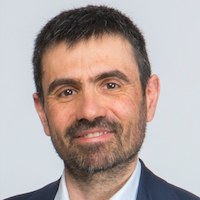Sensor-Based Glucose Monitor Reduces Diabetic Ketoacidosis Hospitalizations
Hospitalization rates decrease 52% for patients with type 1 diabetes and 47% for patients with type 2 diabetes.

Ronan Roussel, MD, PhD
Patients with diabetes who use a sensor-based glucose monitoring system experienced a noticeable decrease in ketoacidosis-related hospitalizations.
The findings, presented at the American Diabetes Association’s (ADA’s) 80th Virtual Scientific Sessions, suggested hospitalizations decreased 52% for patients with type 1 diabetes and 47% for patients with type 2 diabetes who used Abbott’s FreeStyle Libre glucose monitoring device.
“This was a dramatic reduction in ketoacidosis-related hospitalization rates among patients with both type 1 and type 2 diabetes—especially among people who previously had very low self-monitoring of blood glucose—and supports the use of intermittently scanned continuous glucose monitoring systems like the FreeStyle Libre for individuals who are at risk for diabetes-related complications such as diabetic ketoacidosis,” lead study author Ronan Roussel, MD, PhD, said in a statement.
Roussel, chief of the division of endocrinology, diabetes, and nutrition at Bichat Hospital in France, and colleagues conducted the RELIEF study—the largest study on the impact of the FreeStyle Libre system—on rates of hospitalization for diabetic ketoacidosis. The condition is life-threatening but preventable through close glucose monitoring.
The team of investigators retrospectively analyzed diabetic ketoacidosis rates using ICD-10 codes from a French national claims database. There were 33,203 patients with type 1 diabetes and 40,955 patients with type 2 diabetes who used the FreeStyle Libre system between August 1, 2017 and December 31, 2019. Rates of diabetic ketoacidosis were recorded in the year prior to the first sensor claim and in the year after.
Based on the data, yearly rates of diabetic ketoacidosis were reduced after initiation of the system by 52% of patients with type 1 diabetes and 47% of patients with type 2 diabetes. The results were most noticeable in a sub-population of patients who did not use self-monitoring blood glucose testing in the year before using the FreeStyle Libre system, with a 60% reduction for patients with type 1 diabetes and a 51% reduction for patients with type 2 diabetes.
There were also marked reductions in hospitalizations among patients with the most regular use of self-monitoring blood glucose testing (>5 blood glucose test strips reimbursed per day), with a 59% reduction for patients with type 1 diabetes and 52% of those with type 2 diabetes. The investigators also noted a reduction in hospitalization rates for diabetic ketoacidosis among patients treated with multiple daily injections and those who used continuous insulin infusion.
Use of the FreeStyle Libre may have allowed patients to detect and limit persistent hyperglycemia, which subsequently prevented ketoacidosis.
“The positive results of this study demonstrate that intermittently scanned glucose monitoring may have significant implications for patient-centered clinical care and, given the increased burden of ketoacidosis on healthcare utilization and expenditure, it may have a positive impact on long-term economic health outcomes,” Roussel said.
The study, “Dramatic Drop in Ketoacidosis Rate after FreeStyle Libre System Initiation in Type 1 and Type 2 Diabetes in France, Especially in People with Low Self-Monitoring of Blood Glucose (SMBG): A Nationwide Study,” was presented at ADA 2020.